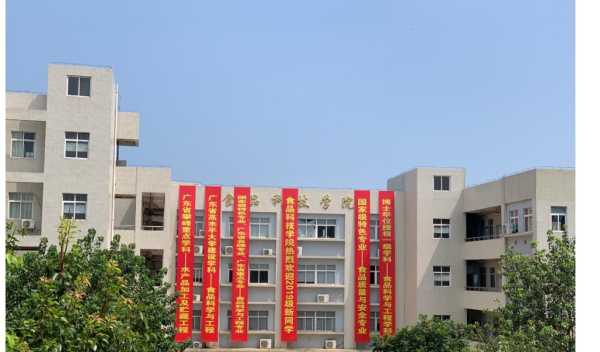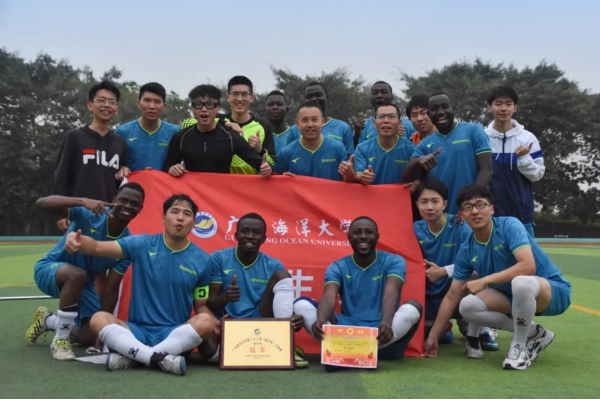The College of Food Science and Technology started in 1950 with the Processing Department of Guangdong Provincial Advanced Aquatic Technology School. In 1977, after the national college entrance examination was resumed, it began to admit the first undergraduate students. In 1999, it began to admit master degree students, since 2002, it has worked with the Chinese Academy of Sciences to train Ph. D. candidates, and in 2014, it began recruiting Ph. D. candidates in food science and engineering.

The college has a complete degree authorization system of “Bachelor, Master and doctor”. Currently, there are doctor degree authorization points in food science and Engineering, Master Degree Authorization Points in Food Science and Engineering, Master Degree Authorization Points in agriculture (in the field of food processing and safety) and master degree authorization points in engineering (in the field ofBiology and Medicine), have Food Science and Engineering, food quality and safety, biological engineering 3 undergraduate programs.
The discipline leader of the college is Professor Zhang Chaohua, the former vice president of Guangdong Ocean University. Food science and engineering are the core disciplines of our university’s “5+1+N” marine discipline system (“5” means 5 first-level doctor disciplines ); was rated as "C+" in the fourth round of national subject evaluation, and 3rd in Guangdong Province; in 2018, it was selected as a key construction subject for high-level universities in Guangdong Province. The secondary discipline "Aquatic Product Processing and Storage Engineering" is the key discipline of Panfeng in Guangdong Province. This discipline is the only food science and engineering discipline with marine food as the main body in South China.
The college currently has 76 full-time teachers, including 18 professors, 21 associate professors, 27 lecturers, 56 teachers with doctor degrees, 26 teachers with more than one year of overseas study experience, and 13 doctor supervisors. There are 36 master tutors. There are 2 post scientists in the National Agricultural Industry Technology System, 1 overseas teaching teacher of the Ministry of Education, 1 Guangdong teaching teacher, 1 Nanyue outstanding teacher, 2 provincial trainees of the Thousand Hundred Ten Project of Guangdong Province, Guangdong Sailing Plan Introduce 2 talents in short supply, 1 high-level talent from Guangdong Yangfan Project, 2 outstanding teaching teams of Guangdong Province, 1 science and technology innovation team of the Department of Education, 1 outstanding scholar of Nanhai of Guangdong Ocean University, 2 outstanding young scholars of Nanhai of Guangdong Ocean University . Sun Baoguo, an academician of the Chinese Academy of Engineering, is the "double-appointed academician" of the college. There are more than 10 professors who work part-time in national professional technical committees and editors of domestic and foreign journals and magazines.
The college has 20 research and teaching platforms, there are 9 provincial (ministry)-level platforms (7 scientific research platforms and 2 teaching platforms) , 4 municipal-level research platforms and 7 training bases (1 national-level and 6 provincial-level) The laboratory has an area of 10000m2, more than 50 sets of large-scale analytical instruments and equipment and a batch of pilot production equipment, with a total value of more than 60 million yuan.
The college currently has 20 scientific research and teaching platforms, including 9 provincial (ministerial) level platforms (7 scientific research platforms, 2 teaching platforms), 4 municipal and departmental scientific research platforms, and 7 talent training bases (1 national, 6 at the provincial level); the laboratory area is 10,000 m2, there are more than 50 sets of large-scale analytical instruments and equipment and a batch of pilot production equipment, with a total value of more than 70 million yuan.
The college follows the strategic needs of the development and utilization of South China Sea biological and subtropical agricultural products resources, and carries out innovative basic and applied research, forming "aquatic product storage and processing", "South China Sea biological active substance research and development", "aquatic food quality and safety" ", "Subtropical agricultural products storage and processing" 4 distinctive research directions. In the past five years, undertook 143 scientific research projects, including 25 national-level (21 National Natural Science Foundation of China), 52 provincial and ministerial level, with a total funding of more than 50 million yuan; published 443 papers, of which 142 were included by SCI/EI, and 2 were included. ESI highly cited papers; 13 monographs and textbooks published; 26 national authorized invention patents and 3 utility model patents; 7 provincial and municipal (departmental) scientific research and teaching awards; breakthrough fish, shrimp, and shellfish Live technology and frozen prepared food processing technology have been applied in more than 20 enterprises across the country, generating economic benefits of more than 3 billion yuan; the research and development of "high-value aquatic protein utilization technology" has led the development of the industry and cultivated 3 high-tech companies in Guangdong Province enterprise.

The quality of talent training in the college has been highly recognized by employers. The college's food science and engineering, food quality and safety majors are national-level specialty majors, the first batch of national outstanding agricultural and forestry talents education and training program reform pilot majors, Guangdong Province famous brand and key majors; it has 6 provincial-level undergraduate students' quality resource sharing courses, 5 provincial-level postgraduate demonstration courses; more than 50 off-campus production and practice bases; in the past 5 years, in the scientific and technological innovation and professional competitions of college students, it has won 1 national award and 32 provincial awards. From 2013 to 2018, the final employment rate of graduates was 100%. 15% of graduates chose to study for postgraduate studies or study abroad, and most graduates are engaged in food-related production, inspection, marketing, and management in enterprises and institutions.
The college attaches great importance to academic exchanges at home and abroad. The college has also established a 3+2 international cooperation talent training model with Lincoln University in New Zealand. Every year, undergraduates and postgraduates are sent to Tokyo Ocean University, Taiwan Ocean University, Kaohsiung Ocean University and universities in South Korea for short-term exchange training. In the past 5 years, it has hosted and hosted 3 international academic conferences, 4 domestic academic conferences, and co-organized 4 domestic academic conferences; teachers participated in more than 200 international and domestic academic conferences. Invite famous domestic and foreign professors to come to the school to give more than 50 academic reports, and teachers to give more than 100 academic reports at home and abroad; send more than 10 teachers to famous universities or scientific research institutions at home and abroad to study for degrees or as visiting scholars. Invited Professor Ravi from Lincoln University of New Zealand to teach the postgraduate course of "Food Toxicology". More than 20 well-known experts and professors at home and abroad have been hired as part-time professors of the college.
The college actively serves local industries and provides consulting and advice to the government. With more than 20 food processing companies such as Zhanjiang Guolian Aquatic Products Development Co., Ltd., China National Fisheries Group Corporation, Guangdong Xingyi Marine Biological Engineering Co., Ltd., established production practice bases and long-term cooperative relationships through technology transfer, providing advanced The processing theory and key technology of the company have improved the economic benefits of the enterprise. Many professors have provided and written more than 50 development proposals and plans on marine aquatic product processing and safety for national and local governments.
A strong country must strengthen the sea, and the sea urgently needs a large number of marine professionals. The 18th National Congress of the Communist Party of China promoted the "marine power" to the level of national strategy for the first time. The 19th National Congress of the Party further emphasized that "adhere to land and sea coordination and accelerate the construction of a maritime power." Standing at the starting point of the new era, the college will firmly seize the favorable opportunity of being selected as a key construction discipline of a high-level university in Guangdong Province, strive to build a domestic first-class internationally renowned food specialty, and cultivate batch after batch of strong comprehensive quality and ability. Innovative and applied talents with a high degree of social recognition.